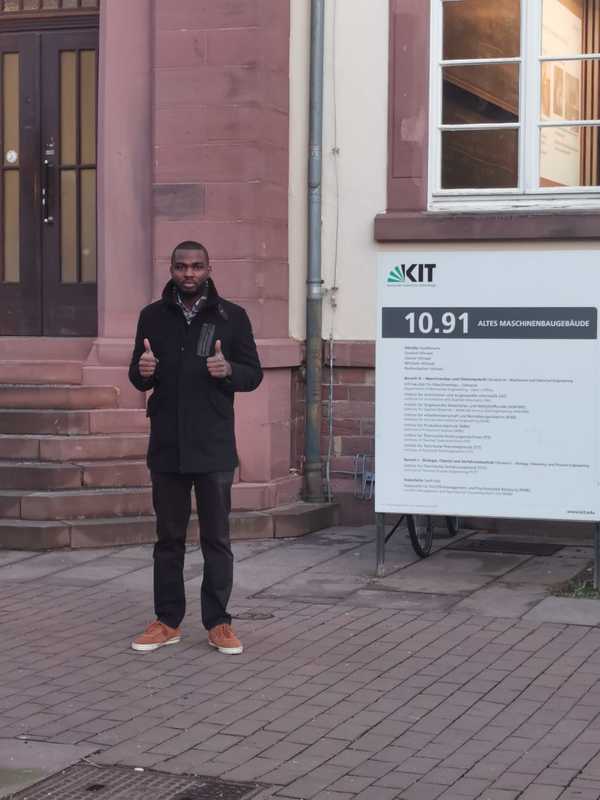Three questions for: Olatomiwa BadmosA former research assistant at Aalen University of Applied Sciences recently successfully defended his doctorate in cooperation with the Karlsruhe Institute of Technology (KIT)

Dr. Olatomiwa Badmos ist "glücklich und erleichtert" über seine frisch abgeschlossene Promotion und freut sich auf den nächsten Schritt in seiner Karriere. Foto: © Hochschule Aalen
The successful completion of a doctorate always means a challenge for the doctoral student that lasts several years. "Great joy and relief" was also felt by Olatomiwa Badmos after he successfully defended his dissertation entitled "Application of deep learning methods in materials microscopy for the quality assessment of lithium-ion batteries and sintered NdFeB magnets" at KIT Karlsruhe a few days ago. The now 30-year-old started as a research assistant at the Materials Research Institute (IMFAA) at Aalen University in June 2017 and began his doctorate in April 2018. In it, he dealt with machine learning methods for microstructure and quality assessment of lithium-ion batteries and sintered NdFeB magnets under the supervision of Prof. Dr. Gerhard Schneider and Dr. Timo Bernthaler and with the participation of KIT. He has also been working as a Senior AI Engineer at AstraZeneca Computational Pathology for more than two years, in December 2022 he was promoted to Associate Director, Oncology Data Science Platforms.
Andrea Heidel (AH): First of all, congratulations from the whole IMFAA team on your successful graduation! How are you doing after having mastered this big task so successfully? And what do you plan to do with all the free time you will have now?
Olatomiwa Badmos (OB): Thank you so much for the kind words and congratulations from the IMFAA team! I'm feeling great after successfully completing my PhD. It was definitely a challenging journey, but it feels amazing and I am so proud of what I have accomplished. I'm excited to have some free time now, and I plan on taking a little break to recharge and spend some time with family and friends. But I am also excited to take the next step in my career and apply my research to make a positive impact in the field. Overall, I am excited for this next chapter and all the possibilities that come with it both personally and professionally.
AH: You lived in London until 2017 and also completed your bachelor's and master's degree there. What brought you to Aalen then, and how was your time at HS Aalen?
OB: I chose to study electrical engineering because I have always been fascinated by the technology that surrounds us, and I knew that this field would allow me to explore that interest in a deep and meaningful way. I moved to Aalen to pursue my PhD at the University of Aalen because it is known for its excellent research program in the field of materials science and I was excited at the opportunity to work with leading researchers in the field and to conduct research that I am passionate about. My time at the University of Aalen was very productive and rewarding. I had the chance to meet and work with many remarkable and interesting people from whom I gained a lot of valuable experience and I am grateful for the support and guidance provided by my professors and colleagues. I currently still live in the region, and I do plan to stay here for the foreseeable future. The region offers a great quality of life and I also have a great support network here.
AH: You've been working at AstraZeneca since September 2020, an international pharmaceutical company that is very familiar to people in Germany as a vaccine manufacturer since the Corona pandemic. How different is your work from what you were involved with during your studies, or where are there overlaps?
OB: My work at AstraZeneca is actually not too different from what I was involved with during my studies, at least there are many overlaps. During my PhD, I focused on using artificial intelligence for the quality assessment of energy related materials from microscopy images. At AstraZeneca, I am working as an artificial intelligence engineer developing software tools and deep learning models for image analysis in computational pathology to assist in the development of new drugs. So, while the subject matter is different the skills and knowledge that I gained during my academic career have been valuable to my current role.
AH: Thank you, and all the best and continued success!
